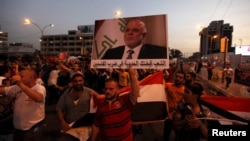Iraqi Prime Minister Haidar al-Abadi announced what he called “sweeping” political reforms after a Cabinet meeting Sunday, in what is being billed as an attempt to stamp out corruption.
Iraqi state TV read a statement Sunday by Abadi that said the proposal wouldeliminate the positions of three vice presidents and three deputy prime ministers.
Government spokesman Saad al-Hadithi told state TV the Cabinet outlined the new reform proposal and is sending it to parliament for discussion. The proposal is to be voted on Tuesday.
Large protests
The reform proposal comes in the wake of large protests in a number of Iraqi cities over corruption and the government's inability to provide electricity, amid a scorching heat wave.
Shi'ite religious leaders, including Grand Ayatollah Ali Sistani, are supporting the move.
Deputy Prime Minister Baha al Araji, whose position will be eliminated in the reform plan, complained at a press conference that corruption is not a recent phenomenon and that those who are incompetent and corrupt must be singled out.
Opponents accuse Araji, who is energy minister, of taking bribes while the electricity grid crumbles.
Sunni Deputy Prime Minister Salah al Mutlaq, whose position would also be eliminated in the reform proposal, told journalists Iraq is in dire straits and he supports the plan.
Mutlaq said the country is going through a grave crisis and he supports the reform proposals he said were put forth to prevent it from worsening.
Mediocre services
Former Prime Minister Nouri al-Maliki, whom many protesters accuse of being responsible for mediocre government services, told supporters it is fine to protest the lack of electricity, but calls to overthrow the government would put the country in an intractable crisis and could lead to massive bloodshed that everyone would regret.
United Arab Emirates-based Middle East analyst Theodore Karasik told VOA, however, that he thinks the Iraqi political elite is about to be subjected to a "major transformation" that will "cut Nouri Maliki down to size."
Some Sunni analysts suggested the anti-corruption plan appears to be a power grab by Shi'ite leaders, but Karasik argued that "the Shi'ites already hold power.
"Ayatollah Sistani's calls to end corruption most likely forced Prime Minister Abadi's hand," he said.












